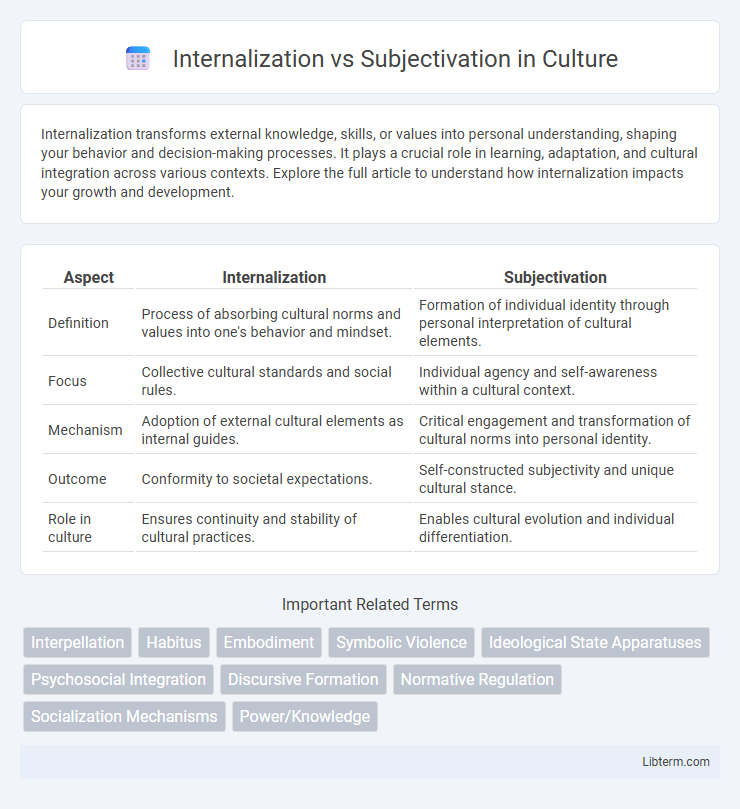Internalization transforms external knowledge, skills, or values into personal understanding, shaping your behavior and decision-making processes. It plays a crucial role in learning, adaptation, and cultural integration across various contexts. Explore the full article to understand how internalization impacts your growth and development.
Table of Comparison
| Aspect | Internalization | Subjectivation |
|---|---|---|
| Definition | Process of absorbing cultural norms and values into one's behavior and mindset. | Formation of individual identity through personal interpretation of cultural elements. |
| Focus | Collective cultural standards and social rules. | Individual agency and self-awareness within a cultural context. |
| Mechanism | Adoption of external cultural elements as internal guides. | Critical engagement and transformation of cultural norms into personal identity. |
| Outcome | Conformity to societal expectations. | Self-constructed subjectivity and unique cultural stance. |
| Role in culture | Ensures continuity and stability of cultural practices. | Enables cultural evolution and individual differentiation. |
Understanding Internalization: Key Concepts
Understanding internalization involves grasping how external norms, values, and knowledge become integrated into an individual's cognitive framework, influencing behavior and perception. This process enables the transformation of socially transmitted information into personally meaningful knowledge, fostering identity formation and social conformity. Key concepts include social learning, cognitive assimilation, and the role of cultural context in shaping internal mental representations.
Defining Subjectivation: An Overview
Subjectivation refers to the process through which individuals become subjects by integrating social norms, values, and power relations into their self-identity and behaviors. Unlike internalization, which involves the unconscious absorption of external influences, subjectivation emphasizes active self-formation and the negotiation of identity within socio-political contexts. This concept is central to understanding how personal agency and structural forces interact in shaping subjectivity.
Historical Origins of Internalization and Subjectivation
Internalization traces back to early 20th-century psychology, particularly the works of Lev Vygotsky, who emphasized the social origins of cognitive processes through internalizing cultural tools. Subjectivation emerges from 20th-century critical theory and post-structuralism, notably in Michel Foucault's analyses of power, where individuals become subjects through complex social and discursive practices. Both concepts historically explore how external factors shape internal consciousness, with internalization emphasizing cognitive assimilation and subjectivation highlighting identity formation within power structures.
Internalization in Psychological Theory
Internalization in psychological theory refers to the process through which individuals adopt the beliefs, values, and norms of their environment, transforming external influences into inner guiding principles. This mechanism plays a crucial role in cognitive and moral development, enabling individuals to regulate behavior according to internal standards rather than external enforcement. Theorists like Vygotsky emphasize internalization as essential for learning, where social interactions become mental functions through gradual assimilation.
Subjectivation in Social and Cultural Contexts
Subjectivation in social and cultural contexts refers to the processes through which individuals come to recognize themselves as distinct subjects shaped by power relations, norms, and cultural practices within their environment. This involves a dynamic negotiation between personal agency and external influences, where identity formation is continuously reconstructed through discourse and social interaction. Unlike internalization, which emphasizes adopting external norms, subjectivation highlights the active role of individuals in producing and transforming their social realities.
Comparing Internalization and Subjectivation
Internalization refers to the process by which individuals absorb external norms, values, and beliefs, making them part of their own cognitive framework, while subjectivation emphasizes the active formation of personal identity through internal dialogue and self-reflection. Internalization often implies adopting external standards passively, whereas subjectivation involves a dynamic negotiation between the self and societal influences, resulting in autonomy and self-awareness. Comparing both reveals that internalization shapes behavioral conformity, whereas subjectivation fosters critical engagement and individual subjectivity.
Mechanisms of Internalization: How Beliefs Are Adopted
Mechanisms of internalization involve the cognitive and social processes through which individuals adopt beliefs, attitudes, and values as their own, often driven by repeated exposure, social reinforcement, and emotional significance. Internalization occurs when external norms or rules become integrated into an individual's self-concept, enabling consistent behavior aligned with those internal standards. This process contrasts with subjectivation, where beliefs are shaped more by personal experiences and reflections rather than external influences.
Processes of Subjectivation: Forming the Self
Processes of subjectivation involve the continuous formation of the self through internalizing social norms, beliefs, and power structures, transforming external influences into personal identity. This dynamic interplay shapes individual subjectivity by negotiating external expectations with internal desires, resulting in a unique sense of agency and self-awareness. Subjectivation emphasizes active self-formation, contrasting with mere internalization, which often implies passive absorption of external elements.
Implications for Identity Formation
Internalization involves integrating external norms and values into the self, shaping identity through adoption of societal expectations. Subjectivation refers to the active process where individuals critically engage with and transform these norms, fostering a unique and reflexive self-concept. The interplay between internalization and subjectivation significantly impacts identity formation by balancing conformity with personal agency and self-definition.
Applications in Modern Social and Behavioral Research
Internalization involves the process by which individuals absorb and integrate external norms, beliefs, or behaviors into their own cognitive framework, shaping identity and social conduct. Subjectivation refers to how individuals actively construct and negotiate their identity through self-reflection and agency within power structures. Modern social and behavioral research applies these concepts to analyze identity formation, socialization processes, and the impact of cultural and institutional influences on personal subjectivities.
Internalization Infographic

 libterm.com
libterm.com